Holistic Health invites us to see health as a living system where the body, mind, and spirit influence each other in daily life. When we nurture the body-mind-spirit connection through small, consistent choices, we lay the groundwork for resilient energy and better well-being. This approach emphasizes mind-body-spirit balance, so emotional clarity, physical vitality, and meaningful purpose reinforce one another. By choosing integrative health practices—from sleep rituals to nourishing meals and gentle movement—we begin to move toward lasting holistic wellness strategies. Ultimately, Holistic Health is not about chasing perfect routines but about cultivating awareness, curiosity, and sustainable habits that honor the whole person.
Viewed through a whole-person lens, this approach to well-being emphasizes balance across body, mind, and spirit rather than isolated symptoms. In LSI terms, you can think of it as a bio-psycho-social-spiritual framework that connects sleep, nutrition, movement, and relationships under one umbrella of care. Other labels you might encounter include integrative care, comprehensive wellbeing, and a synergistic wellness model that prioritizes daily, sustainable habits. Embracing these terms helps create a cohesive path to vitality that resonates with diverse beliefs and lives.
Holistic Health in Daily Life: Strengthening the body-mind-spirit connection through integrative health practices
Holistic Health brings the body, mind, and spirit into a single, living system. When we support the body with foundational nutrition, restful sleep, and regular movement, we unlock clearer thinking, steadier mood, and a more grounded sense of purpose. This body-mind-spirit connection is not a nice-to-have; it’s the engine behind sustainable well-being. By recognizing how physical health, mental clarity, and spiritual meaning influence one another, we can cultivate a resilient baseline for everyday life and reduce the risk of burnout.
Putting holistic wellness strategies into practice doesn’t require drastic changes. Start with small, sustainable steps that reinforce the body-mind-spirit balance: prioritize 7–9 hours of sleep, choose nutrient-dense foods, weave in regular activity, and incorporate short mindfulness or journaling moments. Social and environmental connections—supportive relationships, nature exposure, and meaningful routines—also strengthen the body-mind-spirit connection. Through consistent, integrative health practices, you create a rhythm that aligns daily actions with your values and long-term goals.
Practical Pathways: A Simple Weekly Framework for Holistic Health
A pragmatic approach to Holistic Health centers on a manageable weekly rhythm. For example, plan three core activity blocks that support the body-mind-spirit connection: movement (a mix of cardio and strength), reflection (breathwork, meditation, or journaling), and restoration (sleep routines, mindful meals, or nature time). Framing your week around these pillars provides steady momentum and reinforces holistic wellness strategies without overwhelming you.
Beyond activity, integrate everyday practices that strengthen the integrative health practices you value. Mindful eating, nasal or diaphragmatic breathing during workouts, and periodic digital detoxes are concrete steps that reinforce the body-mind-spirit connection while supporting resilience. By treating these practices as a natural part of daily life, you cultivate a sustainable routine that upholds holistic health across occupations, family life, and personal goals.
Frequently Asked Questions
How can Holistic Health strengthen the body-mind-spirit connection for everyday well-being?
Holistic Health centers the body-mind-spirit connection, so physical health, mental clarity, and meaningful purpose reinforce each other. Practical steps include prioritizing 7–9 hours of sleep, balanced nutrition, regular movement, mindfulness or journaling, and supportive relationships. When you align habits across body, mind, and spirit, energy rises, stress decreases, and resilience grows.
Which integrative health practices support mind-body-spirit balance in a Holistic Health approach?
Integrative health practices are evidence-informed actions that support mind-body-spirit balance in daily life. Examples include quality sleep, nutrient-rich nutrition, varied physical activity, mindfulness and cognitive clarity, social connection, and spiritual or value-based practices. Start small, personalize, and build a sustainable routine to nurture Holistic Health over time.
| Key Point | Brief Explanation | Examples / Notes |
|---|---|---|
| Definition | Holistic Health recognizes the interdependence of body, mind, and spirit and emphasizes a comprehensive, consistent approach rather than isolated tips. | Focus on whole-person well-being, not perfection. |
| Body-Mind-Spirit Connection | What happens in one dimension influences the others; alignment leads to balanced well-being. | Sleep affects mood; purpose or spiritual practices influence stress resilience. |
| Integrative Health Practices | Evidence-informed actions that support the three dimensions through small, sustainable changes. | Sleep 7–9 hours; nutrition with whole foods; regular physical activity; mindfulness; social connections; spiritual practices. |
| Practical Implementations | Assess current status in each domain and plan simple, actionable steps. | Body: exercise schedule; Mind: 5–10 min breathwork; Spirit: value-based activity. |
| Weekly Rhythm | Structured activities across days/week to reinforce habits and balance. | Cardio + mindfulness; strength + nature walk; yoga/stretch; digital detox and spiritual practice. |
| Overcoming Barriers | Common obstacles addressed with small steps, progress metrics, support, and professional guidance. | Start small; measure energy/sleep/mood; build a supportive environment; seek guidance when needed. |
| Science & Evidence | Modern research supports links between lifestyle practices and stress physiology, inflammation, and cognitive function. | Holistic approaches are anchored in biology and neural regulation. |
| Practical Examples | Concrete actions that align with Holistic Health goals. | Mindful eating; breath-focused workouts; nature time; creative expression. |
Summary
Conclusion: Holistic Health is a proactive, person-centered approach to living well, inviting you to cultivate the body-mind-spirit connection as the foundation of energy, resilience, and fulfillment. Through integrative health practices and holistic wellness strategies, individuals can sustain balance across daily life, enriching both personal well-being and the relationships that support it. The journey toward Holistic Health is unique for everyone, shaped by values, culture, and life circumstances, yet the shared aim remains to nurture vitality and meaning by honoring body, mind, and spirit.

